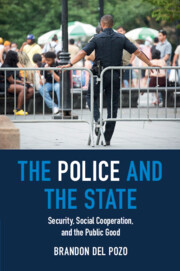Book contents
- The Police and the State
- The Police and the State
- Copyright page
- Contents
- Introduction
- Chapter 1 The Role of the Police
- Chapter 2 The First Power of the Police
- Chapter 3 The Second Power of the Police
- Chapter 4 The Third Power of the Police
- Chapter 5 Democratic Priorities, Relationships, and Tensions
- Chapter 6 The Bases of, and Reasons for Seeking, Police Legitimacy
- Chapter 7 Procedural Justice in Policing Revisited
- Chapter 8 Policing with Public Reason
- Chapter 9 Policing Populism, Protecting Pluralism
- Chapter 10 Primary Goods, Policing States in Transition, and Natural Experiments
- References
- Index
Chapter 3 - The Second Power of the Police
Arrest for Adjudication
Published online by Cambridge University Press: 17 January 2023
- The Police and the State
- The Police and the State
- Copyright page
- Contents
- Introduction
- Chapter 1 The Role of the Police
- Chapter 2 The First Power of the Police
- Chapter 3 The Second Power of the Police
- Chapter 4 The Third Power of the Police
- Chapter 5 Democratic Priorities, Relationships, and Tensions
- Chapter 6 The Bases of, and Reasons for Seeking, Police Legitimacy
- Chapter 7 Procedural Justice in Policing Revisited
- Chapter 8 Policing with Public Reason
- Chapter 9 Policing Populism, Protecting Pluralism
- Chapter 10 Primary Goods, Policing States in Transition, and Natural Experiments
- References
- Index
Summary
The second power of the police is used to collect evidence and people, either summarily or by warrant, and present them to a magistrate for adjudication, principally in matters of criminal law. The traditional model assumes the purpose is to establish guilt and determine the appropriate punishment, with the result being incarceration and the harmful and disruptive consequences that often follow from it. A broader conception considers that the law is what signals the government’s legitimate interest in regulating a behavior owing to its risks and consequences, or the manner in which it violates rights, and these statutes are what empower the police to operationalize the government’s interest. This does not mean, however, that the necessary response should always be punitive; it can instead be linkage to care, treatment, or other interventions that address behavior. The chapter closes by observing that the criminal law is nonetheless what empowers the police to act in response to behaviors regardless of the consent or intentions of others, and if the government wishes to retain this ability while shifting crisis response away from police, it will need to solve the puzzle of how actors not empowered by the criminal law can otherwise decisively represent the government’s regulatory interests regarding individual behavior.
Keywords
- Type
- Chapter
- Information
- The Police and the StateSecurity, Social Cooperation, and the Public Good, pp. 47 - 60Publisher: Cambridge University PressPrint publication year: 2022

